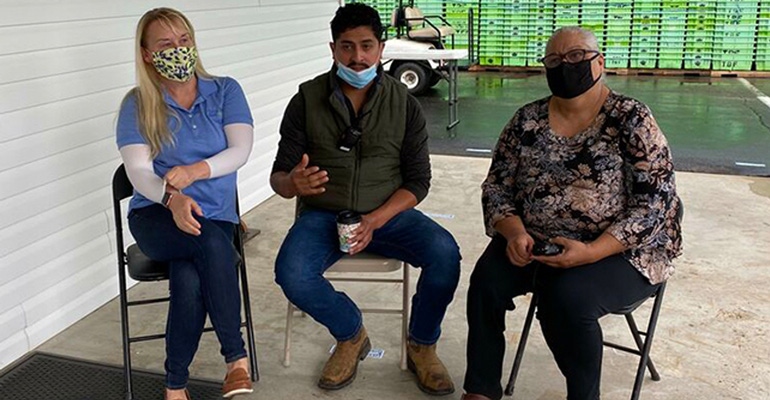September 2, 2020

The Michigan Farm Bureau is reporting that Michigan farmworkers are leaving unpicked fields and orchards, saying workers oppose a new emergency order requiring mandatory testing for COVID-19.
In Grand Junction, MFB says True Blue Berry Management LLC has lost about 150 employees, some leaving to go to work in states with no mandatory COVID-19 testing policies.
In Bangor, a similar story: 14 employees walked away from Heritage Blueberries LLC.
Related: Complete coronavirus coverage
As problems add up for farmworkers at Smeltzer Orchards Co. LLC in Frankfort and True Blue Farms, plaintiffs in a case against the Michigan Department of Human and Health Services (MDHHS), Michigan farm operators now worry about labor availability in 2021, according to MFB.
“Everybody’s affected,” says Manuel Morales Jr., plant manager of True Blue’s packaging plant in Grand Junction. He supervises about 40 employees.
“They don’t want to do the test. I don’t want to do the test,” Morales told MFB. “I worked earlier this year down in Florida for about three to four months. … Florida didn’t have to (mandatory test). Why does Michigan have to? This governor wants us to do it, and it’s only the Latinos. Why? I work with other American people here; they’re not getting tested.”
Legal challenge
Earlier this month, farm employers and employees challenged an Aug. 3 emergency order by MDHHS, which mandated employers of 20 or more migrant or seasonal workers to test workers for COVID-19.
MDHHS Director Robert Gordon says the required testing serves to protect farm and food processing workers from COVID-19, noting that 21 outbreaks of COVID-19 already have occurred in Michigan food processing plants and migrant worker camps.
After the order, the Grand Rapids-based law firm Varnum LLP filed a complaint on behalf of the farmworkers.
However, a recent ruling by the U.S. District Court for the Western District of Michigan upheld state testing requirements, which affect about 75,000 Latino farmworkers, according to MFB.
Ruling being appealed
An appeal on the ruling was filed Aug. 25 by Varnum attorney Ronald DeWaard.
“We are appealing the district court’s decision to the 6th Circuit, where we will ask for an 'injunction pending appeal’ to stay MDHHS’ emergency order pending a full briefing on why the MDHHS emergency order unconstitutionally discriminates against Latinos,” DeWaard says.
Meanwhile, employers who do not abide by rules face financial penalties, while farmworkers who refuse testing will be prohibited from working until they agree to the testing.
Rob Anderson, Michigan Farm Bureau’s manager of government relations, says, “The hundreds of signatures received from agricultural workers in support of the order’s challenge demonstrate that this effort is both grassroots and worker-driven. From the earliest days of this order, farmworkers came forward to farmers and shared that they felt discriminated against and would not stand for mandatory testing.”
Many Michigan farmworkers come from Florida, Georgia and Texas, or through the H-2A guest-worker program.
According to Rex Schultz of Heritage Blueberries, the workers like to move from crop to crop.
Now, he says, “They're pulling out of the state; they're just leaving because they don't want to be a part of this.”
Schultz asked his employees if they wanted to be tested. Most said no and are upset after testing began Aug. 24.
Another Michigan operation lost about 30 farmworkers during apple harvest when it needs hundreds of migrant or H-2A workers. The farm asked to remain anonymous.
“I think it's going to get worse,” Schultz says. “My biggest concern is, are they going to come back next year?”
Source: Michigan Farm Bureau, which is solely responsible for the information provided and is wholly owned by the source. Informa Business Media and all its subsidiaries are not responsible for any of the content contained in this information asset.
Read more about:
Covid 19You May Also Like




